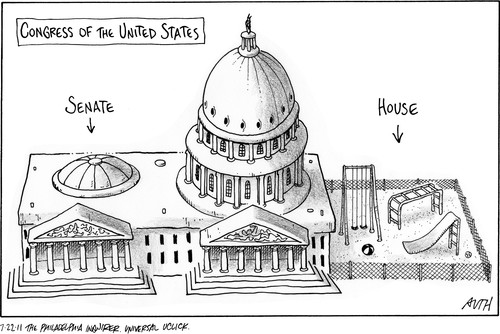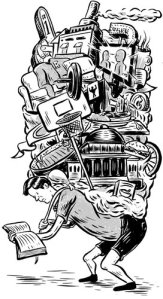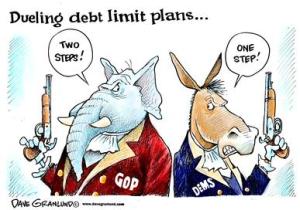Growth Is the Problem

 The ceaseless expansion of economic exploitation, the engine of global capitalism, has come to an end. The futile and myopic effort to resurrect this expansion—a fallacy embraced by most economists—means that we respond to illusion rather than reality. We invest our efforts into bringing back what is gone forever. This strange twilight moment, in which our experts and systems managers squander
The ceaseless expansion of economic exploitation, the engine of global capitalism, has come to an end. The futile and myopic effort to resurrect this expansion—a fallacy embraced by most economists—means that we respond to illusion rather than reality. We invest our efforts into bringing back what is gone forever. This strange twilight moment, in which our experts and systems managers squander  resources in attempting to re-create an expanding economic system that is moribund, will inevitably lead to systems collapse. The steady depletion of natural resources, especially fossil fuels, along with the accelerated pace of climate change, will combine with crippling levels of personal and national debt to thrust us into a global depression that will dwarf any in the history of capitalism. And very few of us are prepared.
resources in attempting to re-create an expanding economic system that is moribund, will inevitably lead to systems collapse. The steady depletion of natural resources, especially fossil fuels, along with the accelerated pace of climate change, will combine with crippling levels of personal and national debt to thrust us into a global depression that will dwarf any in the history of capitalism. And very few of us are prepared.
 “Our solution is our problem,” Richard Heinberg, the author of “The End of Growth: Adapting to Our New Economic Reality,” told me when I reached him by phone in California. “Its name is growth. But growth has become uneconomic. We are worse off because of growth. To achieve growth now means mounting debt, more pollution, an accelerated loss of biodiversity and the
“Our solution is our problem,” Richard Heinberg, the author of “The End of Growth: Adapting to Our New Economic Reality,” told me when I reached him by phone in California. “Its name is growth. But growth has become uneconomic. We are worse off because of growth. To achieve growth now means mounting debt, more pollution, an accelerated loss of biodiversity and the  continued destabilization of the climate. But we are addicted to growth. If there is no growth there are insufficient tax revenues and jobs. If there is no growth existing debt levels become unsustainable. The elites see the current economic crisis as a temporary impediment. They are desperately trying to fix it. But this crisis signals an irreversible change for civilization itself. We cannot prevent it. We can only decide whether we will adapt to it or not.”
continued destabilization of the climate. But we are addicted to growth. If there is no growth there are insufficient tax revenues and jobs. If there is no growth existing debt levels become unsustainable. The elites see the current economic crisis as a temporary impediment. They are desperately trying to fix it. But this crisis signals an irreversible change for civilization itself. We cannot prevent it. We can only decide whether we will adapt to it or not.”
Heinberg, a senior fellow at the Post Carbon Institute, argues that we cannot grasp the real state of the global economy by the usual metrics—GDP, unemployment, housing, durable goods, national deficits, personal income and consumer spending—although even these measures point to severe and chronic problems. Rather, he says, we have to examine the structural flaws that sit like time bombs embedded within the economic edifice. U.S. household debt enabled the expansion of consumer spending during the boom years, he says, but consumer debt cannot continue to grow as house prices decline to realistic levels. Toxic assets litter the portfolios of the major banks, presaging another global financial meltdown. The Earth’s natural resources are being exhausted. And climate change, with its extreme weather conditions, is beginning to exact a heavy economic toll on countries, including the United States, through the destruction brought about by droughts, floods, wildfires and loss of crop yields.
Heinberg also highlights what he calls “the highly dysfunctional U.S. political system,” which is paralyzed and hostage to corporate power. It is unable to respond rationally to the crisis or solve “even the most trivial of problems.”
 “The government at this point exacerbates nearly every crisis the nation faces,” he said. “Policy decisions do not emerge from deliberations between the public and elected leaders. They arise from unaccountable government agencies and private interest groups. The Republican Party has taken leave of reality. It exists in a hermetically sealed ideasphere where climate change is a hoax and economic problems can be solved by cutting spending and taxes. The Democrats, meanwhile, offer no realistic strategy for coping with the economic unraveling or climate change.”
“The government at this point exacerbates nearly every crisis the nation faces,” he said. “Policy decisions do not emerge from deliberations between the public and elected leaders. They arise from unaccountable government agencies and private interest groups. The Republican Party has taken leave of reality. It exists in a hermetically sealed ideasphere where climate change is a hoax and economic problems can be solved by cutting spending and taxes. The Democrats, meanwhile, offer no realistic strategy for coping with the economic unraveling or climate change.”
The collision course is set. It is now only a matter of time and our personal response.
“It could implode in a few weeks, in a few months or maybe in a few  years,” Heinberg said, “but unless radical steps are taken to restructure the economy, it will implode. And when it does the financial system will seize up far more dramatically than in 2008. You will go to the bank or the ATM and there will be no money. Food will be scarce and expensive. Unemployment will be rampant. And government services will break down. Living standards will plummet. ‘Austerity’ programs will become more draconian. Economic inequality will widen to create massive gaps between a tiny, oligarchic global elite and the masses. The collapse will also inevitably trigger the kind of instability and unrest, including riots, that we have seen in countries such as Greece. The elites, who understand and deeply fear the possibility of an unraveling, have been pillaging state resources to save their corrupt, insolvent banks, militarize their police forces and rewrite legal codes to criminalize dissent.”
years,” Heinberg said, “but unless radical steps are taken to restructure the economy, it will implode. And when it does the financial system will seize up far more dramatically than in 2008. You will go to the bank or the ATM and there will be no money. Food will be scarce and expensive. Unemployment will be rampant. And government services will break down. Living standards will plummet. ‘Austerity’ programs will become more draconian. Economic inequality will widen to create massive gaps between a tiny, oligarchic global elite and the masses. The collapse will also inevitably trigger the kind of instability and unrest, including riots, that we have seen in countries such as Greece. The elites, who understand and deeply fear the possibility of an unraveling, have been pillaging state resources to save their corrupt, insolvent banks, militarize their police forces and rewrite legal codes to criminalize dissent.”
 If nations were able to respond rationally to the crisis they could forestall social collapse by reconfiguring their economies away from ceaseless growth and exploitation. It remains possible, at least in the industrialized world, to provide to most citizens the basics—food, water, housing, medical care, employment, education and public safety. This, however, as Heinberg points out, would require a radical reversal of the structures of power. It would necessitate a massive cancellation of debt, along with the slashing of bloated militaries, heavy regulation and restraints placed on the financial sector and high taxes imposed on oligarchic elites and corporations in order to reduce unsustainable levels of inequality. While this economic reconfiguration would not mitigate the effects of climate change and the depletion of natural resources it would create the social stability needed to cope with a new post-growth regime. But Heinberg says he doubts a rational policy is forthcoming. He fears that as deterioration accelerates there will be a greater resolve on the part of the power elite to “cannibalize the resources of society in order to prop up megabanks and military establishments.”
If nations were able to respond rationally to the crisis they could forestall social collapse by reconfiguring their economies away from ceaseless growth and exploitation. It remains possible, at least in the industrialized world, to provide to most citizens the basics—food, water, housing, medical care, employment, education and public safety. This, however, as Heinberg points out, would require a radical reversal of the structures of power. It would necessitate a massive cancellation of debt, along with the slashing of bloated militaries, heavy regulation and restraints placed on the financial sector and high taxes imposed on oligarchic elites and corporations in order to reduce unsustainable levels of inequality. While this economic reconfiguration would not mitigate the effects of climate change and the depletion of natural resources it would create the social stability needed to cope with a new post-growth regime. But Heinberg says he doubts a rational policy is forthcoming. He fears that as deterioration accelerates there will be a greater resolve on the part of the power elite to “cannibalize the resources of society in order to prop up megabanks and military establishments.”
Joseph Tainter, an archeologist, in his book “The Collapse of Complex  Societies” provides a useful blueprint for how such societies unravel. All of history’s major 24 civilizations have collapsed and the patterns are strikingly similar, he writes. The difference this time around is that we will unravel as a planet. Tainter notes that as societies become more complex they inevitably invest greater and greater amounts of diminishing resources in expanding systems of complexity. This proves to be fatal.
Societies” provides a useful blueprint for how such societies unravel. All of history’s major 24 civilizations have collapsed and the patterns are strikingly similar, he writes. The difference this time around is that we will unravel as a planet. Tainter notes that as societies become more complex they inevitably invest greater and greater amounts of diminishing resources in expanding systems of complexity. This proves to be fatal.
 “More complex societies are costlier to maintain than simpler ones and require higher support levels per capita,” Tainter writes. The investments required to maintain an overly complex system become too costly, and these investments yield declining returns. The elites, in a desperate effort to maintain their own levels of consumption and preserve the system that empowers them, through repression and austerity measures squeeze the masses harder and harder until the edifice collapses. This collapse leaves behind decentralized, autonomous pockets of human communities.
“More complex societies are costlier to maintain than simpler ones and require higher support levels per capita,” Tainter writes. The investments required to maintain an overly complex system become too costly, and these investments yield declining returns. The elites, in a desperate effort to maintain their own levels of consumption and preserve the system that empowers them, through repression and austerity measures squeeze the masses harder and harder until the edifice collapses. This collapse leaves behind decentralized, autonomous pockets of human communities.
Heinberg says this is our fate. The quality of our lives will depend on  the quality of our communities. If communal structures are strong we will be able to endure. If they are weak we will succumb to the bleakness. It is important that these structures be set in place before the onset of the crisis, he says. This means starting to “know your neighbors.” It means setting up food banks and farmers’ markets. It means establishing a local currency, carpooling, creating clothing exchanges, establishing cooperative housing, growing gardens, raising chickens and buying local. It is the matrix of neighbors, family and friends, Heinberg says, that will provide “our refuge and our opportunity to build anew.”
the quality of our communities. If communal structures are strong we will be able to endure. If they are weak we will succumb to the bleakness. It is important that these structures be set in place before the onset of the crisis, he says. This means starting to “know your neighbors.” It means setting up food banks and farmers’ markets. It means establishing a local currency, carpooling, creating clothing exchanges, establishing cooperative housing, growing gardens, raising chickens and buying local. It is the matrix of neighbors, family and friends, Heinberg says, that will provide “our refuge and our opportunity to build anew.”
 “The inevitable decline in resources to support societal complexity will generate a centrifugal force,” Heinberg said. “It will break up existing economic and governmental power structures. It will unleash a battle for diminishing resources. This battle will see conflicts erupt between nations and within nations. Localism will soon be our fate. It will also be our strategy for survival. Learning practical skills, becoming more self-sufficient, forming bonds of trust with our neighbors will determine the quality of our lives and the lives of our children.”
“The inevitable decline in resources to support societal complexity will generate a centrifugal force,” Heinberg said. “It will break up existing economic and governmental power structures. It will unleash a battle for diminishing resources. This battle will see conflicts erupt between nations and within nations. Localism will soon be our fate. It will also be our strategy for survival. Learning practical skills, becoming more self-sufficient, forming bonds of trust with our neighbors will determine the quality of our lives and the lives of our children.”
Chris Hedges spent two decades as a foreign reporter covering wars in Latin America, Africa, Europe and the Middle East. His latest books are Days of Destruction, Days of Revolt, Death of the Liberal Class, and The World as It Is: Dispatches on the Myth of Human Progress.
When people have to run faster and faster to hold on to where they were, it is time to consider some unorthodox solutions.
How about revisiting the Lord’s prayer? Forgive us our debts as we forgive those indebted to us.
There would be a huge transformation, redeeming Time and Opportunity, if the people decided they would be better off standing up and affirming their own self-interest by implementing this good, old, common sense advice as the Global Biblical Babylonian economic, military, political system has arrived at it’s end as the Bible said it would:
And he shall judge among the nations, and shall rebuke many people: and they shall beat their swords into plow shares, and their spears into pruning hooks: nation shall not lift up sword against nation, neither shall they learn war any more.



Nice post Ray, I like the cartoons. This reminds me of an interesting interview I saw on TVO’s
“The agenda”, it was talking about the fact the economists are part of a field that’s more related to human sciences, than they are related to hard sciences.Economists are like sociologists and astrologists, people making money trying to predict human behavior, sometimes with disastrous results. And the convenient thing for them, is that they are not held responsible for their outlandish predictions when they turn out to be horribly wrong.
LikeLiked by 1 person
Thanks for your comment, Nick. It’s all part wishful thinking and speculation.
The Bible cautions;
Woe to those who judge for hire and profit,
but not for Justice and Truth.
LikeLike
In all of fairness, has capitalism not brought good things to the world?…
LikeLiked by 1 person
In the beginning was the Word, and the Word was with God, and the Word was God.
The same was in the beginning with God.
All things were made by him; and without him was not any thing made that was made.
In him was life; and the life was the light of men.
And the light shines in darkness; and the darkness comprehended it not.
John 1:1-5
LikeLike
Im not sure i understand ?.. and why cant i reply
LikeLike
Sorry for the late reply. My 1st time revisiting this article since 2012.
Yes Capitalism has brought forth good things, and the Bible doesn’t say money is evil. It says the love of money is the root of all evil. Jesus did not say NEVER will a rich man enter the kingdom of heaven, but hardly ever. It’s always a matter of Individual choice.
The average worker in the nominally Christian Nations in Today’s World, has more comforts for the Flesh, than kings had in the Past as Humans struggle to get to Paradise Again, either Materially or Spiritually.
The nominally Christian Nations are terrified of a microbe they can not see, and many People die from it, unfortunately.
Since the START of this plague, the Death toll, out of the 7,500,000,000 People on the Planet, is approaching 750,000.
The Reality in the same Real World, is 750,000 People DIE of STARVATION EVERY MONTH, month after month.
The Billionaires at the Pinnacle of our Pyramid System are getting richer, while the poor at the Bottom are multiplying and becoming poorer as trickle down Economics has been inverted with the flood of cash flowing up to the very small Minority at the Top. They are in the Position to change that Reality on Earth, but they won’t until the Masses of People Speak up.
Past History tells us about the inevitable END of all Pyramid Systems, Bernie Madoff being a recent example.
I think the purpose of Covid is to slow us down to think beyond the speck of our own Individual selves being being the Center, look around and think of all we know to be Bad and Good, choose the Good, and create a Better Future for Ourselves and our Communities while it’s called Today, the Eternal Sabbath!
For those who believe the Book, it does say at the End of the Human Race to…..? All the works of Man, from Ancient Times to Today, will be brought into Judgment for the Good or Evil.
LikeLike
I think we need a modern-day version of Jesus who takes care of throwing the corrupt merchants out of Wall street…
LikeLike
He better be strong enough to take on this up and coming “corporate military”…lol
LikeLike
That One is pictured as having a two edged sword coming out of his mouth. That One will be able to build up and cut down in the Power of the Word.
As to your earlier comment, “has capitalism not brought good things to the world?”
I thought I answered that by this, “All things were made by him; and without him was not any thing made that was made.”
LikeLike
A police state run by bankers..Oh no!!
The end that Heinburg predicts for mankind seems like a nightmare.. I guess, up to this point, nations who have hard fiscal times can rely on other nations.. But as globilisation approaches, it will be hard to rely on anyone if all the nations are bankrupt at once..
Oh.. If the world were a better place..
Its hard to see any fellowship in man these days, when in fact, people are so busy getting their own..The media continuously fuelling the ideal of praisng materialism and “keep up with the joneses”.. Why would anybody want to see a fellow man do better for himself!?..The idea of community almost seems absurd in todays society..
One can only hope that there is enough love for one another to show solidarity in hard times..
In my opinion, its inevitable that people will resort to community and helping each other out.. I just think its sad that, time and time again, we have to hit the point where its crucial for our survival to do so..
People will have to start looking out for the best interest of the human race and less in their own self-interest
LikeLike
And its sad…No one wants to lend a hand.. give a leg up..
And the thought dread the most is that we always have to hit “situation critical” before we learn the lesson..
LikeLike
I’m not quite sure I understand the reference you made (John 1:1-5).. I was hoping that you could explain more …
Another thing I can understand is why I can’t reply to your comment?
I’m trying different ways do post my question, in hopes of it reaching you…
…Hoping that you haven’t booted me off your blog.. That would be no fun :(…
Well I’m here posted by the machine in hopes to see if my reply has made it back to you…
Your friend Brenn
LikeLike